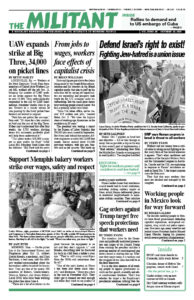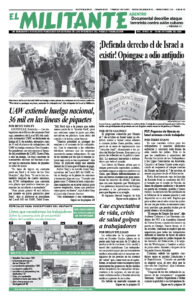Since the Oct. 7 pogrom killing over 1,300 Jews and others in Israel by the Tehran-backed terror group Hamas, there has been an outpouring of solidarity from Ukrainian people at home and abroad toward Jews and Israel. This includes from the Ukrainian president, Volodymyr Zelensky, who is Jewish himself. He declared support for Israel’s “full right to defend itself against terror” and asked to visit Israel to show solidarity.
Kyiv draws a parallel between the existential struggles of Israel against Islamist attacks and Ukraine’s defense of its sovereignty against Moscow’s invasion, with its daily bombings of civilian areas across the country. Of the 45,000 Jews in Ukraine, 1,000 serve in the armed forces.
Hamas’ carefully planned death squad assault came 20 months after the Kremlin’s invasion of Ukraine reverberated around the world. The Oct. 7 pogrom has further accelerated shifts in alignments among capitalist powers worldwide and the danger of spreading wars.
Putin tries to justify his murderous drive to subjugate the Ukrainian people by claiming his invasion was aimed at taking down its “Nazi government.” Today, the Kremlin has ramped up antisemitism to justify its increasingly brutal repression of popular anti-war sentiments and disillusionment with his regime.
Ukraine was occupied by Nazi Germany during the second imperialist world war and was the site of one of the largest mass executions of Jews in human history, at Babyn Yar.
Tens of thousands of Jews, as well as Roma, other Ukrainians who spoke out against the German occupation, and Soviet prisoners of war were mowed down in the ravine.
After the Soviets retook Kyiv, a debate opened up over building a monument to the Jews killed at Babyn Yar, a reminder of the deadly consequences of Jew-hatred and the Holocaust.
But the Stalinist rulers in Moscow rejected the idea. Instead, they tried to obliterate Babyn Yar, planning to build a sports stadium and apartment buildings over the site. Organizations like the Jewish Anti-Fascist Committee and the Jewish section of the Writers Union of Ukraine were shut down.
For decades, leading authors and artists went to Babyn Yar and spoke out in favor of a monument, including Anatoly Kuznetsov, Yevgeny Yevtushenko, and Ivan Dzyuba. Kuznetsov wrote a book, Babi Yar, which was heavily censored in the Soviet Union. Yevtushenko wrote a poem titled “Babyn Yar” that was put to music by Dmitri Shostakovich in his 13th Symphony.
Dzyuba, a Marxist and the author of Internationalism or Russification, which defended Lenin’s position on the national question in Ukraine, led the fight. He addressed an illegal rally in 1966, saying, “Babyn Yar is a tragedy of all mankind, but it happened on Ukrainian soil. And therefore, a Ukrainian has no right to forget it anymore than a Jew. Babyn Yar is our common tragedy, a tragedy for both the Jewish and Ukrainian nations.”
A monument now stands to the Jews killed at Babyn Yar on the site in Ukraine. The uncensored Ukrainian edition of Babyn Yar is assigned reading for high school students there today.

